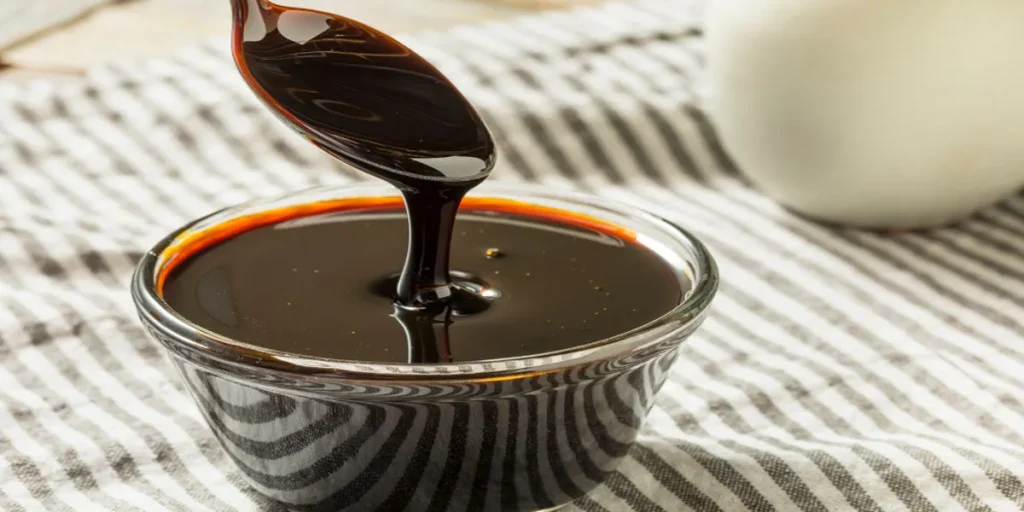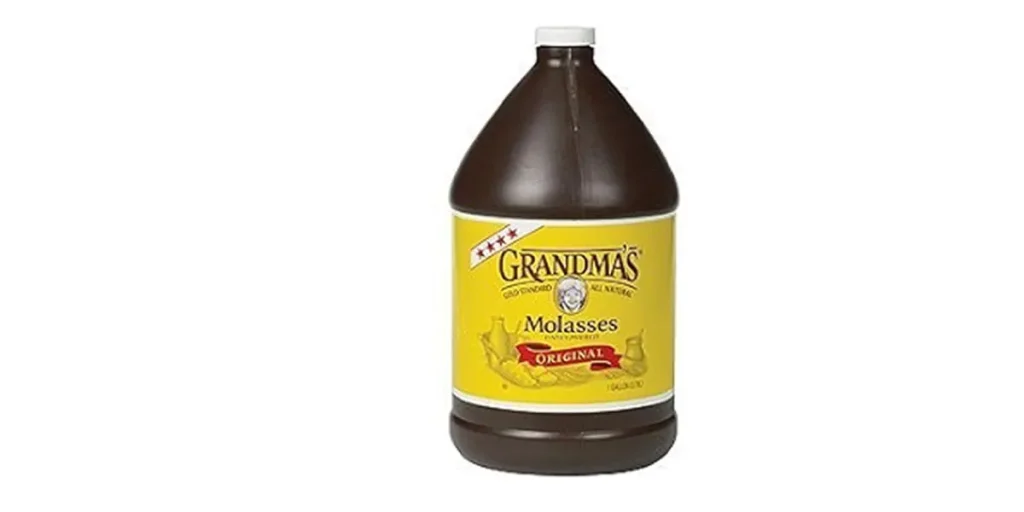A gallon of molasses typically weighs about 11.5 pounds. This weight can slightly vary depending on the type and density.
Molasses, a dense syrup produced during the sugar-making process, is a common sweetener and ingredient in baking.
Its weight is an important consideration for those in cooking and industrial applications, as it affects recipe measurements and shipping costs.
Understanding the exact weight of molasses helps ensure accuracy in these areas. Knowing its weight is also crucial for storage requirements, particularly in bulk quantities.
As a derivative of sugar cane or sugar beets, molasses’ consistency and thus its weight can be affected by the specific processing method and ingredient concentration, which is why a standard gallon has an average weight that can be used as a reliable benchmark.
Mysteries Of Molasses

The word ‘molasses’ conjures images of rich, dark, syrupy sweetness. But there’s more to this sugary substance than meets the eye.
Mysteries of Molasses extend beyond its flavor, delving into the realms of physics and cooking.
Exploring how much a gallon of molasses weighs is not only intriguing but also essential for bakers and chefs who rely on precision.
Captivated By Consistency
The thickness of molasses is like a slow-moving river of sweetness, intriguing in its flow. Consistency matters in both baking and physics. Here’s a glimpse:
- Baking precision enhances flavors and textures.
- Viscosity influences how molasses combines with other ingredients.
- Consistent weight measurements ensure recipe success.
A gallon of molasses has a distinct weight due to its thickness. This surprises many first-time molasses users.
The Surprising Density
When we talk about density, molasses is a heavyweight contender. Its density is much greater than water’s. Here’s what that means in terms of weight:
| Molasses Type | Weight per Gallon |
|---|---|
| Light Molasses | 11 lbs (approx.) |
| Dark Molasses | 11.5 lbs (approx.) |
| Blackstrap Molasses | 12 lbs (approx.) |
The above table doesn’t just list weights; it reveals the unexpected heft of molasses. Such knowledge is crucial for anyone utilizing molasses in large quantities.
Measuring The Molasses
Molasses is a thick, sweet syrup. It’s a by-product of sugar production. Many recipes need molasses by volume or weight.
Knowing how much a gallon of molasses weighs is key for baking and cooking. Let’s dive into the world of measuring this sticky ingredient.
Volume Versus Weight
Volume and weight are different. Volume measures space. Weight measures heaviness. Molasses is tricky. It’s heavier than water.
A gallon of molasses weighs more than a gallon of water. For recipes, getting this right is crucial. Use a kitchen scale for weight. Use measuring cups for volume.
From Cups To Gallons
To convert cups to gallons, remember:
- 16 cups make a gallon.
- Molasses is dense.
A gallon of molasses weighs around 11.5 pounds.
| Cups | Weight (pounds) |
|---|---|
| 1 cup | 0.72 |
| 2 cups | 1.44 |
| 4 cups (1 quart) | 2.88 |
| 16 cups (1 gallon) | 11.5 |
Use this table for converting cups of molasses to weight.
Now, you can cook with molasses perfectly. Enjoy those sweet treats!
The Weighty Reveal

Ever wondered how much a gallon of molasses weighs? Let’s dive into the “weighty reveal” of this thick, sweet syrup and see how it stacks up against the weight of other common liquids.
A Gallon’s Gravitational Pull
Molasses is heavy, thanks to its density. When you measure out a gallon, you feel its heft.
On average, a gallon of molasses weighs about 11.5 pounds. This weight can vary slightly depending on temperature and molasses type.
Comparison To Water
Let’s compare molasses to water. A gallon of water, a standard for measuring liquids, weighs 8.34 pounds.
Here’s a simple table showcasing the differences:
| Liquid | Weight per Gallon |
|---|---|
| Water | 8.34 pounds |
| Molasses | 11.5 pounds |
As the table shows, molasses is significantly heavier than water.
Next time you’re baking, remember this fun fact!
It might give you an extra boost during your workout in the kitchen.
Factors Affecting Molasses Mass
If you’ve ever worked with molasses, you know it’s a unique substance. A gallon of molasses does not have a fixed weight.
Different factors can change how much it weighs. Understanding these factors is key to accurate measurements for any recipe or industrial use.
Temperature’s Role
Temperature changes everything for molasses. As it gets warmer, molasses becomes lighter. Cold makes it heavier. This happens because heat expands the liquid and cold contracts it.
- Warm molasses: Flows better, weighs less.
- Cool molasses: Thicker, weighs more.
Varieties And Viscosity
Different kinds affect weight too. Let’s explore.
| Type of Molasses | Viscosity | Typical Usage |
|---|---|---|
| Light Molasses | Less viscous | Baking |
| Dark Molasses | More viscous | Richer flavoring |
| Blackstrap Molasses | Very thick | Nutritional supplements |
Culinary Implications
Understanding the weight of molasses is crucial in the kitchen. A gallon of molasses typically weighs around 11.5 pounds.
This is important for chefs and home cooks alike. Precise measurements lead to perfect recipes. Let us delve into how this affects recipe adjustments and substitution struggles.
Recipe Adjustments
Recipes often call for molasses in cups or tablespoons. Knowing the weight helps when you need larger amounts. Let’s say your recipe requires a gallon.
You now know you’re adding approximately 11.5 pounds. Use this to balance out other ingredients.
- Boldbaking requires accurate measurements.
- Avoid heavy cakes or runny sauces.
- Always use a kitchen scale for large quantities.
It’s important to adjust your recipe based on the molasses’ weight. If your recipe is scaled up, each ingredient must be increased proportionally to maintain consistency and texture.
Substitution Struggles
Substituting molasses can be tricky due to its unique weight and consistency. Many substitutes, like honey or corn syrup, don’t weigh the same.
A gallon of molasses swapped with honey changes the recipe outcome.
- Match the sweetness carefully but consider weight differences.
- Test substitutions in small batches before full-scale cooking.
- Consult conversion charts for precise measurements.
If replacing molasses, remember the distinct flavors and weights involved. These factors greatly impact the finished dish’s taste and structure.
FAQ About the Weight of a Gallon of Molasses
What Is The Weight Of One Gallon Of Molasses?
A gallon of molasses typically weighs about 11. 5 pounds. This weight can vary slightly based on the molasses density, which is influenced by the type and brand.
How Does Temperature Affect Molasses Weight?
Temperature can affect the density of molasses. As the temperature rises, molasses becomes less dense and may weigh slightly less.
Conversely, cooler temperatures can increase its density and weight.
Can Molasses Weight Vary By Type?
Yes, the weight of molasses can vary by type. Blackstrap molasses is denser and might weigh more than light or dark molasses.
Brand and manufacturing processes also play roles in weight differences.
What’s Heavier: Water Or Molasses?
Molasses is heavier than water. While a gallon of water weighs about 8. 34 pounds, a gallon of molasses weighs around 11. 5 pounds. This is due to the higher density of molasses.
Conclusion
Understanding the weight of a gallon of molasses is vital for both culinary enthusiasts and industry professionals.
We’ve learned that it tips the scales at about 11. 5 pounds, a fact worth remembering for your cooking or manufacturing needs.
Keep this guide handy whenever you need a quick reference for molasses measurements.
Happy cooking!
Resources:
https://fdc.nal.usda.gov/fdc-app.html#/food-details/168820/nutrients
https://www.ams.usda.gov/grades-standards/sugarcane-molasses-grades-standards
